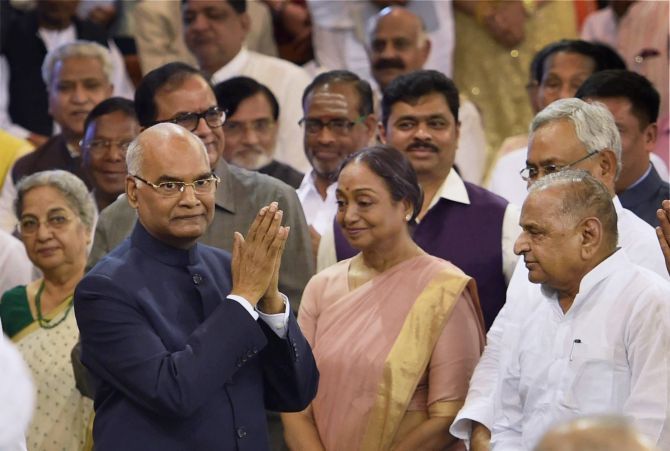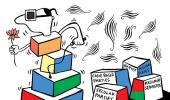'By the combined reading of Articles 101 and 102-1, and 191 and 192, and 239 AA, how did the President become the arbitrator of the disqualification of the members of the Delhi assembly?'

IMAGE: President Ram Nath Kovind. Photograph: Shahbaz Khan/PTI Photo.
Twenty Aam Aadmi Party legislators from the Delhi assembly were disqualified by President Ram Nath Kovind on Sunday, January 21, following the Election Commission's recommendation in the office of profit case.
The Aam Aadmi Party has described President Kovind's decision as 'unconstitutional' and 'dangerous for democracy'.
K M Vijayan, a Constitutional expert, says as per the Constitution, only the governor has the authority to take a decision on matters relating to members of state assemblies, and in this case the power lay with the lieutenant governor of Delhi.
"In the case of a member of the legislature of a state the governor has the powers, and if he is the member of the legislature of a Union territory the power lies with the lieutenant governor," Vijayan tells Rediff.com's Shobha Warrier.
The AAP has alleged that the President acted in haste in approving the Election Commission's recommendation disqualifying 20 of its MLAs. What do you think?
According to Article 102-1a of the Constitution, regarding decisions relating to the disqualification of members of either House of Parliament, the question shall be referred to the decision of the President and his decision shall be final.
It also says that before coming to the decision, the opinion of the Election Commission shall be obtained.
You have to note the words, 'members of either House of Parliament'.
None of the 20 members of AAP are members of Parliament.
What I want to say is, as per the Constitution, had they been members of Parliament, what the President did was following the Constitution.
Now, let us take Articles 191 and 192.
191-1 talks about the disqualification of the members of the states. It says a person shall be disqualified if being a member of the legislative council of a state if s/he holds any office of profit under the Government of India.
Article 192 says that the question of disqualification shall be referred to the governor and the decision shall be final.
Article 239 AA talks of the special provision with respect to Delhi. It says, as from the date of the commencement of the 6th Amendment of 1991, the Union Territory of Delhi shall be called as the national capital territory of Delhi and the administrator appointed will designated as lieutenant governor.
It also talks about the legislative assembly for the national capital territory of Delhi.
It also gives ordinance powers to the lieutenant governor and not the President.
My question is: In the office of profit case, how did the President come into the picture?
By the combined reading of Articles 101 and 102-1, and 191 and 192, and 239 AA, how did the President become the arbitrator of the disqualification of the members of the Delhi legislative assembly?
The Constitution provides the President the powers for members of Parliament under Article 103.
If it is the case of the member of the legislature of a state, the governor has the powers, and if he is the member of the legislature of a Union territory, the power lies with the lieutenant governor.
The January 12 press conference by four Supreme Court judges was described by some as a Constitutional crisis. Do you feel so?
I don't think there was any Constitutional violation as the Chief Justice of India has the powers to allocate portfolios to various judges.
Nobody questions that, but when it is done with malice it is questioned.
It happens when you refer a matter to Bench A or B or C which have judges who are amenable or who will listen to what the Chief Justice wants.
For the last more than 15 years or so, this has been happening, not on the judgment but by allotting certain cases to judges who are amenable or accommodating.
It is not that it happens only in the Supreme Court. It happens in the high courts too.
Regularly?
Of course. Everybody knows this.
Just see how certain election cases were referred to certain amenable judges.
Everything is done in a transparent way; you just allot a particular case to a certain judge expecting a favourable judgment, because you have the power to allot cases.
Yes, the allotment is done with an ulterior motive.
So, more than the judges' press conference, the way certain cases are allotted has tarnished the judiciary more?
That's why I say that what has come in the form of a press conference was only the surfacing of an issue which was not acceptable to many judges for a very long time.
But they remained silent all these years. It is a fact that one day or the other, it has to come out.
What has been going on inside the administrative wing of the court, all the malfunctioning, has surfaced now.
Words like 'revolt', 'Constitutional crisis' are unwarranted.
There is no Constitutional crisis. Did anything happen after the press conference? Nothing.
Has it not tarnished the image of the judiciary?
The image that was covered by a blanket came out in the open once the blanket was removed.
It had to come out one day and it came out.
When do you think the deterioration really started?
Jawaharlal Nehru never tampered with the judiciary and the judges also were very good then.
But 1970 onwards, people never felt the judiciary and politics were with good people.
With Indira Gandhi in power, the deterioration started.
During Indira Gandhi's period, four senior (Supreme Court) judges resigned when they were overlooked (superseded) to be the Chief Justice. It happened in 1973.
When somebody becomes the Chief Justice because of the mercy of someone, it is but natural that he would return it with his service.
Do you feel the Executive's abuse of power continues now?
The Judiciary has always been amenable to the Executive, though theoretically the Judiciary should be independent.
Also, theoretically, the court is the arbiter of all. But factually, the highest power in this country is with the Executive.
Are people losing trust in the judiciary?
People are losing trust in so many things in the system and one among them is the judiciary though the judiciary says they are the only hope.
As a lawyer, I lost trust with the system long back.










